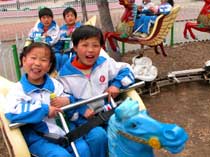|
Rural dwellers to be granted urban rights
By Zheng Caixiong , Wu Yong and Guo Nei (China Daily)
Updated: 2005-11-02 05:44
A landmark initiative to abolish the division between "rural residents" and
"urban residents" is being developed by 11 Chinese provinces.

Primary school kids
in a rural district in Shenyang, Liaoning Province, take a ride in a park
in Shenyang in this April 11, 2005 photo. Liaoning is one of the pilot
province testing the scheme to grant rural residents with urban rights.
[newsphoto] | The reforms are expected to grant people from rural areas all the political,
educational and social security benefits as their urban counterparts.
Pilot provinces include Liaoning in Northeast China, Shandong and Fujian in
East China, and Guangdong in South China.
Guangdong will allow all farmers to register as urban residents in one or two
years, Ou Guangyuan, deputy secretary of the Guangdong Provincial Committee of
the Communist Party of China, said on Monday at a work conference.
Liaoning is also to wipe out differences between urban and rural residence
permits, granting the latter the same rights to education, employment and
medical care.
"Liaoning's urbanization is comparatively advanced and we have many small
cities which have the ability to absorb possible new residents from the
countryside," an official, surnamed Li from Liaoning Public Security Department,
said yesterday.
Shaanxi Province in Northwest China has also announced it will abolish the
urban-rural division within the next five years.
Earlier, Deputy Minister of Public Security Liu Jinguo said reforms will help
usher in a unified management system on permanent residence registration.
However, public security experts are still calling for a cautious attitude to
reform, saying random steps will lead to chaos.
Bian Haihong of the Beijing Public Security Bureau said yesterday that there
are four areas which need special attention.
Education. More children will be vying for limited places in city schools.
Healthcare. Can the government afford to foot the new urban dwellers' medical
bills?
Social security. Can local governments afford the newcomers' social security
demands?
Public order. If the system is adopted too quickly, a huge influx of people
living in poverty could spark a rise in crime.
In November 2001, Zhengzhou, capital of Central China's Henan Province,
offered free permanent registration permits to people with relatives already
living in the city. Increased pressure on transport, education, healthcare and a
rise in crime forced the city to cancel the measure three years later, said
Bian.
So far, most large cities are similarly unprepared for a rapid transfer, he
added.
(China Daily 11/02/2005 page3)
|